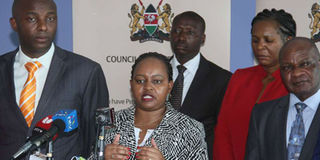Premium
Cash crisis key topic as counties' meeting begins

Council of Governors' Vice Chairperson Anne Waiguru addresses a news conference regarding the annual devolution conference, at Delta House, Nairobi, on April 12, 2018. PHOTO | MARTIN MUKANGU | NATION MEDIA GROUP
What you need to know:
- Last week, governors lamented that counties were yet to receive full allocations of development funds for this financial year.
- County bosses will use the conference to realign their development programme with the national government’s 'Big Four' pillars.
The annual devolution conference starts in Kakamega today to discuss progress that counties have made over the last five years amid the push and pull with the national government.
While governors have maintained full political control of their counties, the four-day meeting is likely to discuss their partial financial and administrative control.
This is because of the recurrent complaints by governors over delays of cash disbursements and interference in devolved functions.
Counties have consistently suffered due to the National Treasury’s delay in disbursing funds.
PROJECTS
The county bosses have also decried insufficient funds. As a result, they say the cash-starved counties cannot pay debts, staff salaries or rollout crucial development projects.
By law, the counties are entitled to at least 15 per cent of the government’s audited revenues.
The Public Finance Act 2012 mandates the National Treasury to disburse monies to the devolved units at the beginning of every month and in any event, not later than the 15th day from the commencement of the quarter.
The act further emphasises that the disbursement shall be done in accordance with a schedule prepared by Treasury in consultation with the Intergovernmental Budget and Economic Council.
Already, National Treasury Cabinet Secretary Henry Rotich indicated that he intends to reduce county allocations by between Sh15 billion and Sh18 billion in the next financial year.
ALLOCATION
Last week, governors lamented that counties were yet to receive full allocations of development funds for this financial year as the national government grapples with a cash crisis.
County operations have been affected, with procurement and supplies being the worst hit.
To beat the crunch, Tharaka-Nithi Governor Muthomi Njuki proposed fiscal consolidation measures including stopping all international travel and other avoidable costs in order to pay salaries.
His Bungoma counterpart Wycliffe Wangamati complained that counties in the region have not received any allocation since October last year, derailing service delivery.
Nevertheless, devolution has in the past four years delivered encouraging results in many counties.
They include provision of better healthcare, upgrade of rural roads and renovation of hospitals.
But despite these achievements, there are concerns about inequality within counties brought about by the inability to handle some functions.
FUNCTIONS
The Fourth Schedule of the Constitution, pertaining the distribution of functions, states that the national government retains 35 functions among them security, foreign affairs, immigration and citizenship and national economic planning.
Counties are to handle 14 functions like agriculture, county health services, and pre-primary education, among others.
Most of these functions were previously the responsibility of local authorities.
Devolution Cabinet Secretary Eugene Wamalwa said the functions will form one of the key areas of discussions in the conference.
“Focus of the fifth Devolution Conference is to take stock of the accomplishments made in the implementation of devolved functions, share experiences on emerging issues, best practices, establish pending work and make recommendations by both levels of government,” he said.
“Counties cannot succeed on their own. The national government will continue supporting devolution not just through resources but also capacity building,” he said in an interview on a local TV station.
'BIG FOUR' AGENDA
Kirinyaga Governor Anne Waiguru said county bosses will use the conference to realign their development programme with the national government’s 'Big Four' pillars — food security, affordable housing, universal healthcare and manufacturing.
Key opposition leaders will share a podium with President Kenyatta and address the conference at Kakamega High School.
A draft programme of the event released by the Council of Governors (CoG) shows that ODM leader Raila Odinga, Senate Minority Leader James Orengo, Kakamega Senator Cleopas Malala and Governor Wycliffe Oparanya will make keynote speeches.
Mr Malala, who was elected on Amani National Congress ticket, has been one of the fiercest critics of the Jubilee government until Mr Odinga and President Kenyatta shook hands.
SECURITY
The senator will deliver his speech immediately after the arrival of President Kenyatta.
Governor Oparanya will follow. The two will make their remarks as the host leaders.
The draft says President Kenyatta will officially open the meeting and later be part of a panellist's discussion on Intergovernmental Relations.
Other panellists will be Chief Justice David Maraga, CoG chairperson Josphat Nanok and Senate and National Assembly speakers.
County Commissioner Mr Abdinuzak Jaldesa said the venue and other facilities to be used by guests will be accorded 24-hour security.
According to the official, about 640 police officers will be dispatched to the region and 60 vehicles deployed for patrol.





